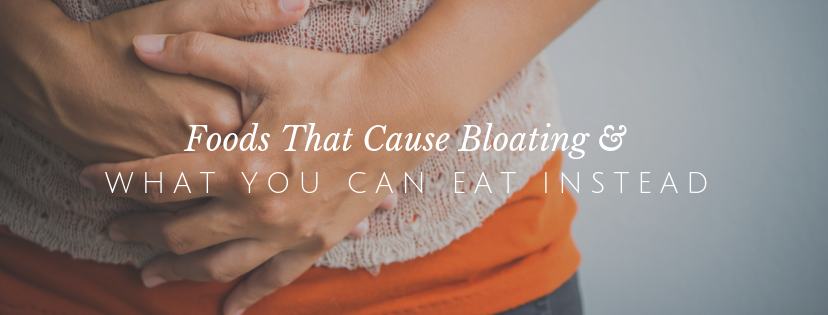
15 Jun Are these foods causing your belly bloat?
Which foods cause bloating?
With so many contradictory claims, it’s hard to know what is healthy to eat and what to avoid. This confusion can lead you to give up and ask “why even try?!”
Each one of us is unique. Even foods touted as healthy can still cause discomfort for some. Bloating is a signal from your body to tell you that something that you ate, doesn’t work for your unique body.
Here are a few of the main culprits which can cause bloating…
1. Beans
Beans are a great low calorie source of fiber, and a good source of protein. But many of them contain a type of sugar in the FODMAP group (fermentable oligo-, di-, mono-saccharides, and polyols). Beans can cause gas as they digest which gives you that unpleasant, bloated belly. Soaking the beans in acid, like vinegar or lemon juice, prior to eating, can help release the phytic acid, making them easier to digest. The easiest beans to digest are mung and adzuki beans and light colored lentils. Note: canned beans have not been pre-soaked, so they may cause gas and discomfort.
2. Wheat / Gluten
Whole wheat has always touted as a healthier alternative, but not if you have a sensitivity to gluten. Gluten is the protein found in wheat, barley and rye, which can cause bloating in many people. Wheat also contains FODMAPs, as discussed above. If you tend to bloat after eating gluten containing products, choose gluten-free options like quinoa, buckwheat, steel cut oats, or use almond or coconut flour.
3. Dairy Products
If you’ve noticed bloating after eating yogurt, cheese, butter, or drinking milk, it’s possible that you have an issue with dairy. There are different types of issues with dairy: lactose intolerance – which means you don’t have the enzymes (lactaid) necessary to process the milk sugar (lactose) or you may have a dairy sensitivity, which is harder to diagnose. Many people cannot process dairy well, so try going dairy free for a few weeks and see if you feel better. It’s easy to find an alternative for milk, like almond milk, coconut milk, oat milk, or cashew milk. For cheeses, try a goat or sheep cheese, which are easier to digest (1) and see if that makes a difference.
4. Cruciferous veggies
While cruciferous veggies like broccoli, cabbage, cauliflower, and Brussels sprouts are incredibly healthy, they can lead to stomach distress. To make them easier to digest, cook them first. If that doesn’t work, choose other veggies like spinach, leafy greens, zucchini, cucumbers, and sweet potatoes.
5. Garlic and onions
Garlic and onions are prebiotics, which stimulate the growth and balance of healthier bacteria in your colon. In addition, they add delicious flavor when cooked, but often cause stomach upset when eaten raw. If cooking doesn’t resolve the problem, try fresh herb alternatives like thyme, basil, chives, or parsley for added flavor.
Just because certain foods are healthy doesn’t mean they work for you. If you frequently bloat after eating, keep a journal of what you eat and write down how you feel immediately after you eat as well as an hour later. Once you have your journal, it will be much easier to identify the potential offender. The easiest way to confirm the trigger is to eliminate the food for at least a few weeks and see how you feel. This is worth so much more than a test, as you are learning about your body and what works best to fuel it.
Do you struggle to figure out what causes bloating for you? Pay attention to the foods above and see if you notice any discomfort.
For best results to determine which foods cause bloating for you, use the journal method to identify your culprits. If you need help, please email me. I may have some useful tricks up my sleeve for you!




Sorry, the comment form is closed at this time.